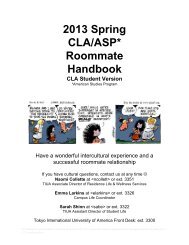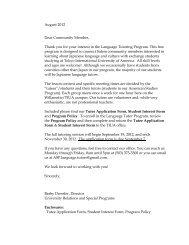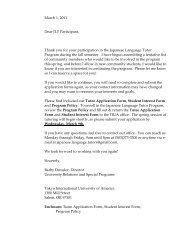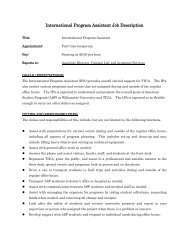American Studies Program 2012 CATALOG - Tokyo International ...
American Studies Program 2012 CATALOG - Tokyo International ...
American Studies Program 2012 CATALOG - Tokyo International ...
Create successful ePaper yourself
Turn your PDF publications into a flip-book with our unique Google optimized e-Paper software.
THE MISSION OF TOKYO INTERNATIONAL<br />
UNIVERSITY OF AMERICA<br />
Revised and Approved June 10, 1994<br />
<strong>Tokyo</strong> <strong>International</strong> University of America (TIUA), established in Salem, Oregon, USA<br />
as a branch campus of <strong>Tokyo</strong> <strong>International</strong> University (TIU), Kawagoe, Japan provides<br />
an educational environment that enables students to pursue academic goals,<br />
develop inter-cultural awareness and explore personal values and interests.<br />
With the cooperation of Willamette University (WU) and under the general direction<br />
of TIU, TIUA offers intensive English language and Liberal Arts courses under the<br />
<strong>American</strong> <strong>Studies</strong> <strong>Program</strong> (ASP).<br />
Co-curricular programs in Residence Life and Student Activities are designed to offer<br />
students opportunities to learn about other people and cultures. As a result, students<br />
gain and share insights about their own traditions and values.<br />
The main goal of the academic and co-curricular programs is to prepare students to<br />
become global citizens able to cross over national and cultural boundaries and barriers<br />
so they can serve as models for others and help build a truly international community.<br />
(J - pg. 3)<br />
GOALS<br />
In order to more fully clarify its mission, <strong>Tokyo</strong> <strong>International</strong> University of America has<br />
established the following goals for students in its educational programs:<br />
1. Improve communication skills in English.<br />
2. Learn about and better understand the U.S. and Japanese societies<br />
through comparative studies in academic subject areas such as<br />
economics, politics, history, psychology, sociology, and literature.<br />
3. Study and understand the diversity of the cultures and lifestyles<br />
represented in our global society.<br />
4. Encourage the development of interpersonal relationships among<br />
students, faculty, staff, and people in the local community, basing such<br />
relationships on the acceptance and appreciation of diversity.<br />
5. Facilitate, through participation in both formal and informal educational<br />
opportunities, the achievement of personal goals and the development<br />
of a renewed understanding of one’s own identity and one’s<br />
place in society.<br />
(J - pg. 111)<br />
Page 6






